Related Research Articles

The prime minister of the United Kingdom is the head of government of the United Kingdom. The prime minister advises the sovereign on the exercise of much of the royal prerogative, chairs the Cabinet and selects its ministers. As modern prime ministers hold office by virtue of their ability to command the confidence of the House of Commons, they sit as members of Parliament.
The shadow cabinet or shadow ministry is a feature of the Westminster system of government. It consists of a senior group of opposition spokespeople who, under the leadership of the Leader of the Opposition, form an alternative cabinet to that of the government, and whose members shadow or mirror the positions of each individual member of the Cabinet. Their areas of responsibility, in parallel with the ruling party's ministries, may be referred to as a shadow portfolio. Members of a shadow cabinet have no executive power. It is the shadow cabinet's responsibility to scrutinise the policies and actions of the government, as well as to offer alternative policies. The shadow cabinet makes up the majority of the Official Opposition frontbench, as part of frontbenchers to the parliament.
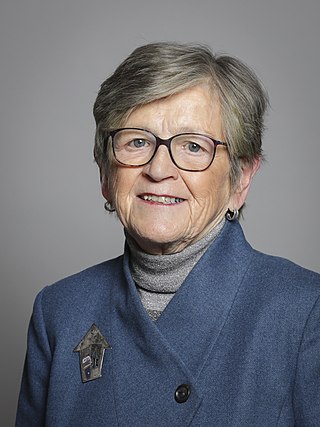
Hilary Jane Armstrong, Baroness Armstrong of Hill Top, DL is a British Labour Party politician who was the Member of Parliament (MP) for North West Durham from 1987 to 2010.

The Chancellor of the Duchy of Lancaster is a ministerial office in the Government of the United Kingdom. Excluding the prime minister, the chancellor is the highest ranking minister in the Cabinet Office, immediately after the Prime Minister, and senior to the Minister for the Cabinet Office. The role includes as part of its duties the administration of the estates and rents of the Duchy of Lancaster.
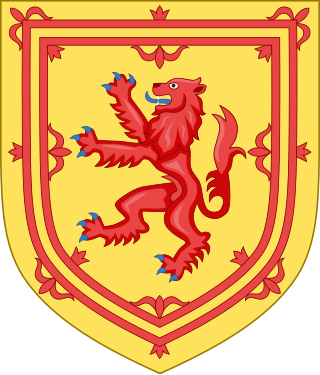
The Scottish Government is the devolved government of Scotland. It was formed in 1999 as the Scottish Executive following the 1997 referendum on Scottish devolution.

The secretary of state for defence is a secretary of state in the Government of the United Kingdom, with responsibility for the Ministry of Defence. As a senior minister, the incumbent is a member of the Cabinet of the United Kingdom.

The secretary of state for health and social care, also referred to as the health secretary, is a secretary of state in the Government of the United Kingdom, responsible for the work of the Department of Health and Social Care. The incumbent is a member of the Cabinet of the United Kingdom.
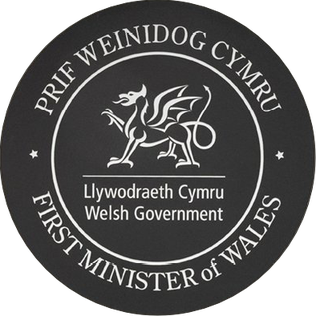
The first minister of Wales is the leader of the Welsh Government and keeper of the Welsh Seal. The first minister chairs the Welsh Cabinet and is primarily responsible for the formulation, development and presentation of Welsh Government policy. Additional functions of the first minister include promoting and representing Wales in an official capacity, at home and abroad, and responsibility for constitutional affairs, as they relate to devolution and the Welsh Government.
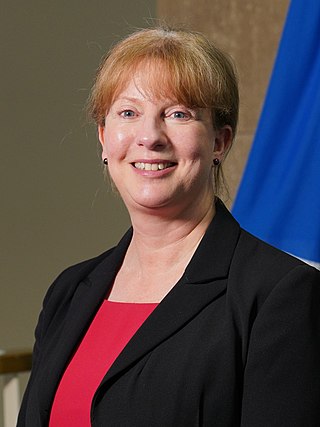
Shona McRory Robison is a Scottish politician serving as Deputy First Minister of Scotland and Cabinet Secretary for Finance since 2023. A member of the Scottish National Party (SNP), she has been the Member of the Scottish Parliament (MSP) for Dundee City East since 2003 and was an additional member for the North East Scotland region from 1999 to 2003.

The secretary of state for levelling up, housing and communities, also referred to as the levelling up secretary, is a secretary of state in the Government of the United Kingdom, and Cabinet minister, responsible for the overall leadership and strategic direction of the Department for Levelling Up, Housing and Communities (DLUHC). They are responsible for local government in England.

Roberta Carol Blackman-Woods is a British academic and former Labour Party politician who was the Member of Parliament (MP) for the City of Durham from 2005 to 2019.

Angela Constance is a Scottish politician serving as Cabinet Secretary for Justice and Home Affairs since 2023. A member of the Scottish National Party (SNP), she has been the Member of the Scottish Parliament (MSP) for Almond Valley since 2007.
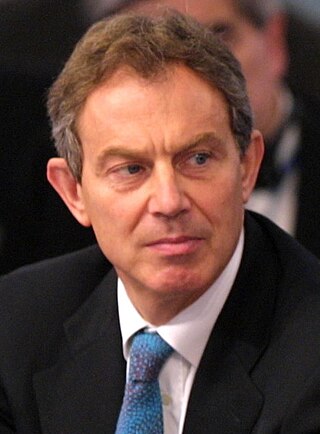
Following poor results for the Labour Party in the local elections in England on 4 May 2006, British Prime Minister Tony Blair held a cabinet reshuffle the following day.

The Exchequer Secretary to the Treasury is a junior ministerial post in His Majesty's Treasury, ranked below the First Lord of the Treasury, the Chancellor of the Exchequer, the Chief Secretary to the Treasury, the Paymaster General and the Financial Secretary to the Treasury, and alongside the Economic Secretary to the Treasury. It ranks at Parliamentary Secretary level and is not a Cabinet office. Unlike the other posts of Secretary to the Treasury, it is only used occasionally, normally when the post of Paymaster General is allocated to a minister outside the Treasury.
The Social Exclusion Task Force (SETF) was a part of the Cabinet Office that provided the UK Government with strategic advice and policy analysis in its drive against social exclusion. It was preceded by the Social Exclusion Unit, which was set up by the Labour government in 1997 and formed part of the Office of the Deputy Prime Minister. The SETF was abolished in November 2010, and its functions absorbed into the Office for Civil Society.

Gregory David Clark is a British politician who served as Secretary of State for Levelling Up, Housing and Communities from 7 July 2022 to 6 September 2022. A member of the Conservative Party, he has served as Member of Parliament (MP) for Tunbridge Wells since 2005. He is currently the Chair of the Science and Technology Select Committee.

Peter Kyle is a British politician serving as Shadow Secretary of State for Science, Innovation and Technology since 2023. A member of the Labour Party, he has been Member of Parliament (MP) for Hove since 2015.
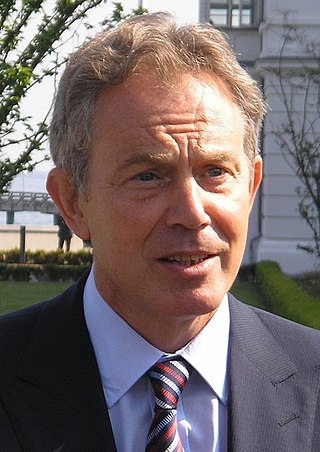
The third Blair ministry lasted from May 2005 to June 2007. The election on 5 May 2005 saw Labour win a historic third successive term in power, though their majority now stood at 66 seats – compared to 167 four years earlier – and they failed to gain any new seats. Blair had already declared that the new term in parliament would be his last.

Her Majesty's Principal Secretary of State for Exiting the European Union or, informally, Brexit Secretary, was a secretary of state in the Government of the United Kingdom, responsible for the business of the Department for Exiting the European Union, as well as for the UK's withdrawal from the European Union (EU), informally referred to as "Brexit". The secretary of state oversaw Brexit negotiations following a 2016 referendum, in which a majority voted in favour of exiting the EU. The officeholder was a member of the Cabinet.

The second Johnson ministry began on 16 December 2019, three days after Boris Johnson's audience with Queen Elizabeth II where she invited him to form a new administration following the 2019 general election. The Conservative Party was returned to power with a majority of 80 seats in the House of Commons. Initially the ministers were largely identical to those at the end of the first Johnson ministry, but changed significantly in cabinet reshuffles in February 2020 and September 2021.
References
- ↑ "Cabinet to get exclusion minister". BBC News. 24 February 2006. Retrieved 8 December 2009.
- ↑ "Mrs Barbara Roche". UK Parliament. Retrieved 9 December 2021.
- ↑ "Mr Phil Woolas". UK Parliament. Retrieved 9 December 2021.
- ↑ "Baroness Armstrong of Hill Top". UK Parliament. Retrieved 9 December 2021.